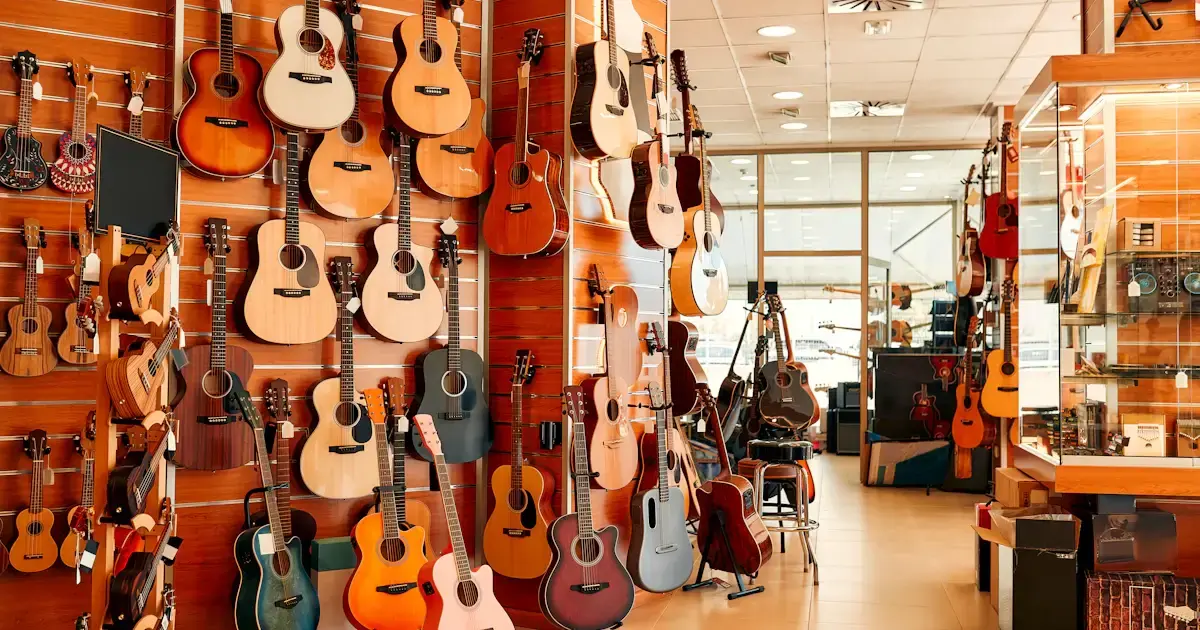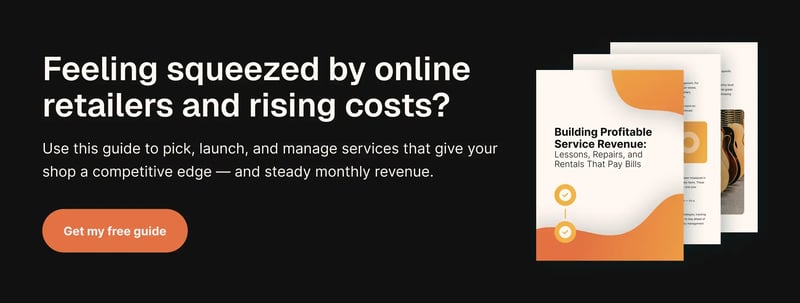
Small music store owners have faced an uphill battle in recent years.
The increase in large music retailers, including online outlets, has contributed to a slight decline in the number of music stores, which fell by 2% in 2023. As the industry adjusts to new market factors, some hopeful music store owners are hesitant to enter the industry. The question they’re all asking is, “how much do music stores make?” While the answer varies based on many factors, small music stores continue to thrive.
To keep your business afloat or to start a new music store, you need to think outside the box and implement new strategies. In this blog, we’ll offer seven tips to help you raise profits, so your store can serve musicians for years to come.
How Much Do Music Stores Make?
So, how much do music stores make? The annual income of a retail music store owner is estimated to be between $25,000 and $80,000. This is a wide range, as the number varies based on many factors.
These are some of the factors that affect how much revenue a music store brings in:
- Location: Where your store is located plays a significant role in how many customers roll in. The more foot traffic there is around your store, the more customers are likely to find it. Locations in large cities and proximity to other retail stores and shopping centers tend to increase customers, while more suburban or rural areas tend to see fewer customers.
- Time in operation: It takes time for a retail store to build up a network of customers. A music store that’s been in business for years has had time to generate customer loyalty and gain credibility in the eyes of musicians. They’ve also had time to perfect their retail strategy. For this reason, more established music stores tend to generate greater revenue.
- Store size: The larger your music store is and the more inventory it has to sell, the more revenue it stands to bring in — but only if there’s enough demand in your area for the items you stock. Do your research early to determine which instruments are most popular in your area and avoid overstocking niche instruments that don’t have many players. For areas with fewer musicians, a smaller store may be a more feasible option.
- Specialization: There are different kinds of music stores. Some stores sell a wide variety of instruments, while others specialize in a certain kind of instrument. Generally, stores that sell more popular instruments bring in more revenue. Some of the most popular instruments include guitar, piano, violin, saxophone, ukulele, and harmonica.
7 Tips To Increase Your Music Store’s Profits
To run a successful music store, you need high-quality instruments, reasonable prices, and great customer service. Here are seven ideas to expand on your business model by adding additional merchandise and services, offering greater value to customers.
1. Sell Used Instruments
Not all of the instruments you sell to customers have to be brand new. As you experiment with different business models, consider selling used instruments, offering trade-in deals, or doing consignment work. As long as a used instrument is in decent condition, it can likely be sold for a reduced price. This can attract more cost-conscious or beginner musicians to make purchases.
You can procure some used instruments from customers by offering trade-in deals. A customer brings in a used instrument, you determine how much you think you can sell it for, and then you offer a reduced amount to the customer as store credit. This helps you acquire used instruments, and encourages customers to use their store credit for other purchases.
In a consignment model, a customer brings in an instrument, which you sell in exchange for a commission. For musical instruments, you can typically charge a commission of about 15–30%. Selling on consignment can help you acquire unique and sometimes rare instruments without needing to purchase them outright.
Related Read: How To Offer Musical Instrument Consignment at Your Store
2. Add Music Accessories
Musicians need music accessories to keep their instruments in working order — and if you offer them at your store, your customers are likely to buy them from you out of convenience.
Depending on the kinds of instruments you sell, consider offering accessories like:
- Guitar case, strap, picks, capo, string winder
- Drum key, drug, dampening pads, drumsticks
- Keyboard stand, bench, cover
- Tuner
- Music stand
- Metronome
- Instrument cleaning supplies
Creating bundles is an effective way to sell more accessories. You can create a bundle with a guitar and all its essential accessories for a reduced price. Beginner guitarists likely want to get everything they need at once, so they’ll be willing to spend a little more for the entire set.
Parents of young musicians also want to give their children everything they need to be successful with a new instrument, making bundles a good option. By encouraging the customers you have to spend a little extra, selling accessories helps you increase store revenue.
3. Teach Music Lessons
Offering music lessons at your music store is a great way to increase revenue while sharing your love of music with others. You can teach music lessons yourself for any instrument that you play proficiently, or hire qualified instructors to teach them.
To successfully offer lessons, make sure you have a reliable digital system to help you manage appointments. You need to keep track of who’s coming in, who’s teaching them, what time all of the appointments are, which instrument each student plays, and a record of their progress. Some point of sale (POS) systems have features to manage scheduling appointments, so you can keep all of this information in one place.
Students who take music lessons at your store are more likely to make purchases there, helping you increase sales.
Related Read: How To Schedule Music Lessons at Your Retail Store: 10 Tips
4. Stock Rental Instruments
For some music stores, rental fees make up a significant portion of revenue. This is especially true for stores in communities with lots of students participating in school band programs. If a middle school or high school recommends your store to their students, you can gain many customers. But to accommodate this, you need a large inventory of instruments.
To grow your rental program, create a simple and convenient experience for renters, whether they’re students, parents of a student, or an adult learning an instrument. Set clear rental fees and lengths of time a renter can keep an instrument.
Remember: You can use a digital system (like your POS) to send out automatic reminders, so renters remember to renew or bring their instrument back on time.
Related Read: How To Track Musical Instrument Rentals With Your POS
5. Offer Instrument Repairs
Offering repairs helps you make your music store a one-stop-shop that serves all of your customers’ music needs. To effectively offer repairs, you need the know-how, the equipment, and the right digital systems in place. You need to be able to track what instruments come in, what repairs are needed, and what repairs have already been done, as well as communicate updates to customers to keep them in the loop.
Depending on your experience level, you may be able to perform repairs yourself. If you need extra help or you’re less familiar with some instruments, hire experienced technicians to do full or part-time work at your music store. Great repairs encourage customers to recommend your services to their friends, helping you boost brand awareness and increase revenue from repair work.
Related Read: How To Become a Musical Instrument Repair Technician
6. Create a Vintage Vinyl Record Section
Some music stores sell only instruments, while others sell physical media like vinyl records, tapes, and CDs. Physical media from the past like vinyl records have made a resurgence in recent years, with both older collectors and younger enthusiasts. Try setting up a section of your store with retro items like vinyls and other vintage music memorabilia. You can even include a listening station with headphones.
Offering items like vinyl records draws in a different group of customers, who may also be interested in the instruments and accessories your music store offers. The more people you can draw into your store, the more revenue you’re likely to make.
7. Host Live Performances
Your music store will be more successful if you can create a sense of community among your customers. A great way to do this is to host events in your store, including live music events.
Invite local artists and bands to perform at your music store and advertise these events on social media and in the community. Good experiences make people want to come back, and getting a crowd in your store allows local music enthusiasts to see the instruments you offer.
How To Increase Revenue at Your Music Store With Music Shop 360
So, how much do music stores make? While the answer varies, you can make more money by trying new strategies to help your customers. The best solution is likely to use multiple methods and pay attention to which ones your customers respond to.
Depending on the area your store is based in and the musicians who live there, you may experience more success by offering rentals, repairs, used instruments, lessons, or some combination of these.
Over time, you’ll determine which of these strategies have gained the most traction. Lean into your successes, and if something doesn’t pan out, learn from it. Eventually, you’ll create a customized business model that works for your music store.
To support you in these new ventures, you need a sophisticated POS system with digital tools designed for music stores: Music Shop 360.
Music Shop 360 is an all-in-one, cloud-based POS platform with the features you need to run your music store. With tools for lessons, rentals, repairs, consignment, and more, you have everything you need to increase sales. The system is also integrated with platforms like Reverb and My Music Staff, providing additional functionality to help you run your business.
To see Music Shop 360 for yourself, schedule a demo today!




 by
by 






![4 Music Store Inventory Management Challenges [+ Solutions]](https://musicshop360.com/hs-fs/hubfs/_Blog/Blog%20Featured%20Images/Music%20Shop%20360/1%2029%204%20Music%20Store%20Inventory%20Mangement%20Challenges%20%5BBLOG%5D.webp?width=520&height=294&name=1%2029%204%20Music%20Store%20Inventory%20Mangement%20Challenges%20%5BBLOG%5D.webp)
